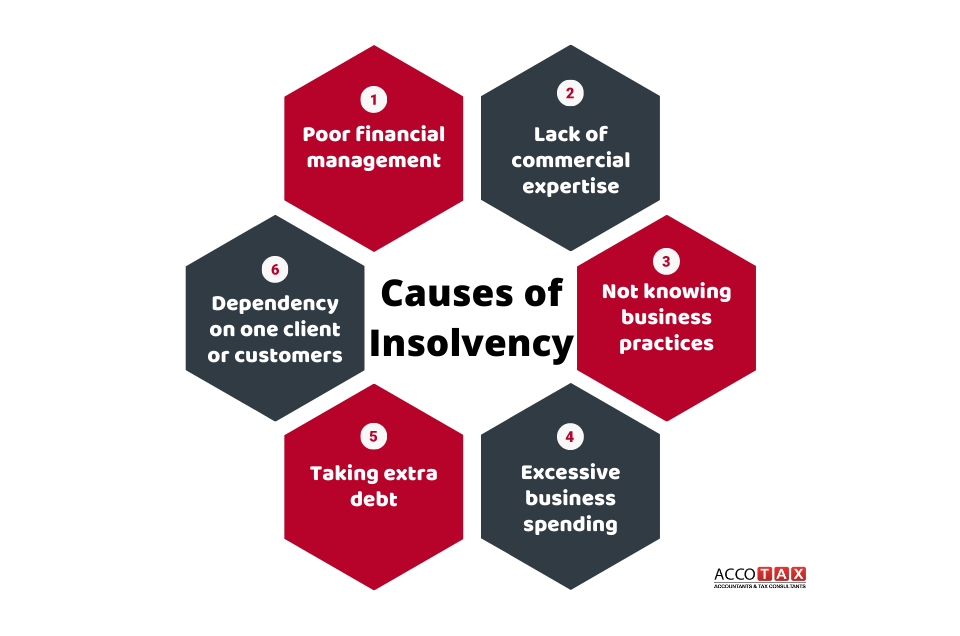An Unbiased View of Insolvency Practitioner
An Unbiased View of Insolvency Practitioner
Blog Article
The Ultimate Guide To Insolvency Practitioner
Table of ContentsSome Known Questions About Insolvency Practitioner.Excitement About Insolvency PractitionerAn Unbiased View of Insolvency PractitionerGet This Report on Insolvency PractitionerInsolvency Practitioner Things To Know Before You Get ThisInsolvency Practitioner for DummiesInsolvency Practitioner Things To Know Before You Get ThisThe Insolvency Practitioner Ideas9 Easy Facts About Insolvency Practitioner Explained
This can take place for a number of reasons, including inadequate economic monitoring, unforeseen expenses, or a modification out there. If a company is insolvent, it may be forced to fold or market off properties to pay lenders. This can have a major impact on the company, employees, and shareholders.
The Definitive Guide to Insolvency Practitioner
Various other reasons for insolvency include fraud, mismanagement, and unforeseen expenses. When a firm comes to be insolvent, its properties are used to pay off its financial obligations. This can have a significant effect on business, as it may no much longer have the ability to continue operating. Insolvency can additionally bring about work losses and the closure of organizations.
The firm may be forced to market assets, lay off team or even shut down. Lenders might be left out of pocket and the business's investors may see their financial investment vanish.
Insolvency is the procedure whereby a business is wound up and its possessions are liquidated to pay financial institutions. This is generally the last hope, as it can have a really adverse result on the firm's online reputation. Receivership takes place when a firm is not able to pay its financial debts and is positioned under the control of an exterior manager.
The Main Principles Of Insolvency Practitioner
Volunteer management resembles receivership, but it is initiated by the directors of the firm as opposed to the financial institutions - Insolvency Practitioner. This choice is usually utilized when a company is facing monetary difficulties yet there is still really hope that it can be transformed around. Company insolvency is a complicated and major concern that can have significant implications for organizations of all sizes
With the right aid, you can guarantee that your organization has the very best chance of weathering this tough time.
Rumored Buzz on Insolvency Practitioner
Whatever your reason for closing your organization, there are many considerations you need to address before 'closing the doors'. There's likewise a great deal you can do to make the procedure much less stressful and get much better end results. Closing down your company is not nearly meeting the useful and legal demands.
Deal with your employees As an employer, you need to keep an eye on and give support to your workers throughout this demanding time. Be aware of any possible health and wellbeing issues they might experience because of: job insecuritytransitioning through the sale of the businesschange in owners. You can: There are broadly 2 scenarios in which you would voluntarily close your organization.
You also: do not want to, or can not, market the businesshave no-one to take it over. You're most likely to have time to intend your closure. This will certainly assist you to: close efficientlymeet your lawful obligationssave moneytake away maximum revenues. You could be closing your Visit Website company since: it's not covering its overheads and operating costsyou can't maintain the operating prices while attempting to sell it.
A Biased View of Insolvency Practitioner
There are lots of points you need to address before shutting your business. Your accountant, solicitor or business adviser will be able to aid you with this.
:max_bytes(150000):strip_icc()/Liquidation-4193561-Final-699e67d885c243c39cac2985b16d51cb.jpg)
You must settle all tax issues for your business, also if it's no much longer trading. This includes your responsibilities concerning repayment of: fringe advantages taxpay-as-you-go (PAYG)superannuationemployment discontinuation.
Everything about Insolvency Practitioner
Insolvency occurs when your company can not pay its financial obligations, which can result in your service shutting down. Various bankruptcy treatments apply to individuals and business.
If you try to take care of it yourself, you'll need to communicate with every creditor individually to attempt to work out routine repayment amounts. Insolvency or bankruptcy advisers can: support you via the click over here processhelp you recognize your optionsnegotiate with your financial institutions on your part. They hold certain permits and credentials in this specialized area.
Insolvency Practitioner - Truths

Individual insolvency for single investors and people within partnerships Individual insolvency procedures use to: Prior to starting an individual insolvency process, it's essential to understand the: influence of the consequenceshow long the influence will be., likewise understood as a Component IX arrangement, allows you, or the selected manager, to negotiate with your lenders to pay a percent of the combined financial obligations over a duration of time to your manager, instead than trying to continue making repayments to each financial institution.
Firm bankruptcy and liquidation An 'insolvent company' is unable to pay its financial obligations or cover the expense of its expenses. In some scenarios, bankrupt firms might enter into liquidation. Liquidation is when an independent registered liquidator is selected to take control over the business and end up the company service in an orderly method.
The Ultimate Guide To Insolvency Practitioner
As noted in the Intro, while the try this site record expresses certain choices relative to a few of the more vital of these selections, it does not try to establish standards in this complex area. In addition, it might need to be upgraded in the future to consider advancements in this field.
Sonia Piccinini committed substantial effort and time in the preparation of this magazine. The views shared in the report are those of the IMF's Legal Division and must not be credited to the Exec Supervisors or the Management of the IMF. FRANOIS GIANVITI Current experience has shown the degree to which the absence of orderly and effective insolvency treatments can worsen economic and monetary situations.
Report this page